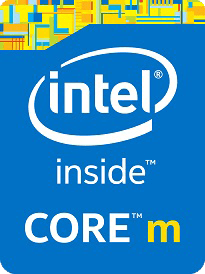
Intel Core M-5Y10c Benchmark, Test and specs
Last updated:
The Intel Core M-5Y10c has 2 cores with 4 threads and is based on the 5. gen of the Intel Core M series. The processor uses a mainboard with the BGA 1234 socket and was released in Q4/2014. The Intel Core M-5Y10c scores 527 points in the Geekbench 5 single-core benchmark. In the Geekbench 5 multi-core benchmark, the result is 1,184 points.

| Name: | Intel Core M-5Y10c |
|---|---|
| Family: | Intel Core M (16) |
| CPU group: | Intel Core M 5 (7) |
| Architecture: | Broadwell Y |
| Segment: | Mobile |
| Generation: | 5 |
| Predecessor: | -- |
| Successor: | -- |
CPU Cores and Base Frequency
The Intel Core M-5Y10c has 2 CPU cores and can calculate 4 threads in parallel. The clock frequency of the Intel Core M-5Y10c is 0.80 GHz (2.00 GHz). The number of CPU cores greatly affects the speed of the processor and is an important performance indicator.
| CPU Cores / Threads: | 2 / 4 |
|---|---|
| Core architecture: | normal |
| Cores: | 2x |
| Hyperthreading / SMT: | Yes |
|---|---|
| Overclocking: | No |
| Frequency: | 0.80 GHz |
| Turbo Frequency (1 Core): | 2.00 GHz |
| Turbo Frequency (2 Cores): | 1.60 GHz |
Internal Graphics
The Intel Core M-5Y10c has integrated graphics, called iGPU for short. Specifically, the Intel Core M-5Y10c uses the Intel HD Graphics 5300, which has 192 texture shaders and 24 execution units. The iGPU uses the system's main memory as graphics memory and sits on the processor's die.
| GPU name: | Intel HD Graphics 5300 |
|---|---|
| GPU frequency: | 0.30 GHz |
| GPU (Turbo): | 0.80 GHz |
| Compute units: | 24 |
| Shader: | 192 |
| Hardware Raytracing: | No |
| Release date: | Q3/2014 |
| Max. displays: | 3 |
|---|---|
| Generation: | 8 |
| Direct X: | 11.2 |
| Technology: | 14 nm |
| Max. GPU Memory: | 16 GB |
| Frame Generation: | No |
Hardware codec support
A photo or video codec that is accelerated in hardware can greatly accelerate the working speed of a processor and extend the battery life of notebooks or smartphones when playing videos.
| h265 / HEVC (8 bit): | Decode |
|---|---|
| h265 / HEVC (10 bit): | Decode |
| h264: | Decode / Encode |
| VP8: | Decode |
| VP9: | Decode |
| AV1: | No |
|---|---|
| AVC: | Decode / Encode |
| VC-1: | Decode |
| JPEG: | Decode / Encode |
Memory & PCIeThe processor can use up to 16 GB memory in 2 (Dual Channel) memory channels. The maximum memory bandwidth is 25.6 GB/s. The memory type as well as the amount of memory can greatly affect the speed of the system. |
|
| Memory type: | Memory bandwidth: |
|---|---|
| DDR3L-1600 | 25.6 GB/s |
| Max. Memory: | 16 GB |
| Memory channels: | 2 (Dual Channel) |
| ECC: | No |
| PCIe: | 2.0 x 12 |
| PCIe Bandwidth: | 6.0 GB/s |
Thermal ManagementThe thermal design power (TDP for short) of the processor is 4.5 W. The TDP specifies the necessary cooling solution that is required to cool the processor sufficiently. The TDP usually gives a rough idea of the actual power consumption of the CPU. |
|
|---|---|
| TDP (PL1 / PBP): | 4.5 W |
| TDP (PL2): | -- |
| TDP up: | -- |
| TDP down: | -- |
| Tjunction max.: | -- |
Technical details
The Intel Core M-5Y10c is made in 14 nm. The smaller the manufacturing process of a CPU, the more modern and energy-efficient it is. Overall, the processor has 4.00 MB cache. A large cache can greatly speed up the processor's speed in some cases such as games.
| Technology: | 14 nm |
|---|---|
| Chip design: | Monolithic |
| Socket: | BGA 1234 |
| L2-Cache: | -- |
| L3-Cache: | 4.00 MB |
| AES-NI: | Yes |
| Operating systems: |
| Virtualization: | VT-x, VT-x EPT, VT-d |
|---|---|
| Instruction set (ISA): | x86-64 (64 bit) |
| ISA extensions: | SSE4.1, SSE4.2, AVX2 |
| Release date: | Q4/2014 |
| Release price: | -- |
| Part Number: | -- |
| Documents: | Technical data sheet |
Rate this processor
Benchmark results

The benchmark results for the Intel Core M-5Y10c have been carefully checked by us. We only publish benchmark results that have been created by us or that have been submitted by a visitor and then checked by a team member. All results are based on and fullfill our benchmark guidelines.
Geekbench 5, 64bit (Single-Core)
Geekbench 5 is a cross plattform benchmark that heavily uses the systems memory. A fast memory will push the result a lot. The single-core test only uses one CPU core, the amount of cores or hyperthreading ability doesn't count.

|
AMD FX-6300
6C 6T @ 4.10 GHz |
||

|
AMD 3015e
2C 4T @ 2.30 GHz |
||

|
Intel Xeon E5450
4C 4T @ 3.00 GHz |
||
|
|
Intel Core M-5Y10c
2C 4T @ 2.00 GHz |
||

|
MediaTek Helio G96
8C 8T @ 2.05 GHz |
||

|
Intel Core M-5Y10
2C 4T @ 2.00 GHz |
||

|
Intel Core M-5Y10a
2C 4T @ 2.00 GHz |
||
Geekbench 5, 64bit (Multi-Core)
Geekbench 5 is a cross plattform benchmark that heavily uses the systems memory. A fast memory will push the result a lot. The multi-core test involves all CPU cores and taks a big advantage of hyperthreading.

|
Intel Pentium G3250T
2C 2T @ 2.80 GHz |
||

|
Intel Pentium G3440T
2C 2T @ 2.80 GHz |
||

|
Intel Core i5-4250U
2C 4T @ 2.60 GHz |
||
|
|
Intel Core M-5Y10c
2C 4T @ 1.60 GHz |
||

|
Intel Celeron 6305
2C 2T @ 1.80 GHz |
||
|
|
HiSilicon Kirin 950
8C 8T @ 2.30 GHz |
||

|
Intel Core i3-3130M
2C 4T @ 2.60 GHz |
||
Geekbench 6 (Single-Core)
Geekbench 6 is a benchmark for modern computers, notebooks and smartphones. What is new is an optimized utilization of newer CPU architectures, e.g. based on the big.LITTLE concept and combining CPU cores of different sizes. The single-core benchmark only evaluates the performance of the fastest CPU core, the number of CPU cores in a processor is irrelevant here.

|
Intel Core i7-2700K
4C 8T @ 3.90 GHz |
||

|
Intel Core i3-4330TE
2C 4T @ 2.40 GHz |
||

|
Intel Core i7-3540M
2C 4T @ 3.70 GHz |
||
|
|
Intel Core M-5Y10c
2C 4T @ 2.00 GHz |
||

|
AMD Athlon X4 845
4C 4T @ 3.80 GHz |
||

|
Intel Xeon Bronze 3204
6C 6T @ 1.90 GHz |
||

|
Qualcomm Snapdragon 678
8C 8T @ 2.20 GHz |
||
Geekbench 6 (Multi-Core)
Geekbench 6 is a benchmark for modern computers, notebooks and smartphones. What is new is an optimized utilization of newer CPU architectures, e.g. based on the big.LITTLE concept and combining CPU cores of different sizes. The multi-core benchmark evaluates the performance of all of the processor's CPU cores. Virtual thread improvements such as AMD SMT or Intel's Hyper-Threading have a positive impact on the benchmark result.

|
Intel Celeron 7305
5C 6T @ 1.10 GHz |
||

|
Intel Core i7-860S
4C 8T @ 2.53 GHz |
||

|
UNISOC T606
8C 8T @ 1.60 GHz |
||
|
|
Intel Core M-5Y10c
2C 4T @ 1.60 GHz |
||

|
Intel Atom x6413E
4C 4T @ 2.40 GHz |
||

|
Intel Pentium G3440
2C 2T @ 3.30 GHz |
||

|
Intel Pentium G3430
2C 2T @ 3.30 GHz |
||
Cinebench R20 (Single-Core)
Cinebench R20 is the successor of Cinebench R15 and is also based on the Cinema 4 Suite. Cinema 4 is a worldwide used software to create 3D forms. The single-core test only uses one CPU core, the amount of cores or hyperthreading ability doesn't count.

|
AMD FX-6300
6C 6T @ 4.10 GHz |
||

|
AMD A8-5600K
4C 4T @ 3.90 GHz |
||

|
Intel Celeron J4125
4C 4T @ 2.70 GHz |
||
|
|
Intel Core M-5Y10c
2C 4T @ 2.00 GHz |
||

|
Intel Core i5-2520M
2C 4T @ 3.20 GHz |
||

|
AMD Phenom II X4 965
4C 4T @ 3.40 GHz |
||

|
AMD FX-8320E
8C 8T @ 4.00 GHz |
||
Cinebench R20 (Multi-Core)
Cinebench R20 is the successor of Cinebench R15 and is also based on the Cinema 4 Suite. Cinema 4 is a worldwide used software to create 3D forms. The multi-core test involves all CPU cores and taks a big advantage of hyperthreading.

|
Intel Celeron N4100
4C 4T @ 2.40 GHz |
||

|
Intel Core i7-4510U
2C 4T @ 2.70 GHz |
||

|
Intel Core i3-2330M
2C 4T @ 2.20 GHz |
||
|
|
Intel Core M-5Y10c
2C 4T @ 1.60 GHz |
||

|
Intel Pentium N4200
4C 4T @ 2.50 GHz |
||

|
AMD A6-3500
3C 3T @ 2.40 GHz |
||

|
Intel Celeron N3450
4C 4T @ 2.20 GHz |
||
iGPU - FP32 Performance (Single-precision GFLOPS)
The theoretical computing performance of the internal graphics unit of the processor with simple accuracy (32 bit) in GFLOPS. GFLOPS indicates how many billion floating point operations the iGPU can perform per second.

|
Intel Core i7-3687U
Intel HD Graphics 4000 @ 1.20 GHz |
||

|
Intel Core M-5Y10
Intel HD Graphics 5300 @ 0.80 GHz |
||

|
Intel Core M-5Y10a
Intel HD Graphics 5300 @ 0.80 GHz |
||
|
|
Intel Core M-5Y10c
Intel HD Graphics 5300 @ 0.80 GHz |
||

|
AMD A9-9410
AMD Radeon R5 (Stoney Ridge) @ 0.80 GHz |
||

|
AMD A6-6420K
AMD Radeon HD 8470D @ 0.80 GHz |
||

|
AMD A6-6400K
AMD Radeon HD 8470D @ 0.80 GHz |
||
Estimated results for PassMark CPU Mark
Some of the CPUs listed below have been benchmarked by CPU-monkey. However the majority of CPUs have not been tested and the results have been estimated by a CPU-monkey’s secret proprietary formula. As such they do not accurately reflect the actual Passmark CPU mark values and are not endorsed by PassMark Software Pty Ltd.

|
Intel Core i3-3220T
2C 4T @ 2.80 GHz |
||

|
AMD Phenom II X2 545
2C 2T @ 3.00 GHz |
||

|
AMD Phenom II X2 B55
2C 2T @ 3.00 GHz |
||
|
|
Intel Core M-5Y10c
2C 4T @ 1.60 GHz |
||

|
AMD A4-5150M
2C 2T @ 3.30 GHz |
||

|
AMD Athlon II X4 620
4C 4T @ 2.60 GHz |
||

|
Intel Core i7-2677M
2C 4T @ 1.80 GHz |
||
Cinebench R15 (Single-Core)
Cinebench R15 is the successor of Cinebench 11.5 and is also based on the Cinema 4 Suite. Cinema 4 is a worldwide used software to create 3D forms. The single-core test only uses one CPU core, the amount of cores or hyperthreading ability doesn't count.

|
Intel Core i3-4158U
2C 4T @ 2.00 GHz |
||

|
AMD Athlon X4 835
4C 4T @ 3.40 GHz |
||

|
AMD Phenom II X6 1055T
6C 6T @ 3.30 GHz |
||
|
|
Intel Core M-5Y10c
2C 4T @ 2.00 GHz |
||

|
AMD A9-9425
2C 2T @ 3.70 GHz |
||

|
Intel Pentium Silver J5005
4C 4T @ 2.80 GHz |
||

|
Intel Core i3-5005U
2C 4T @ 2.00 GHz |
||
Cinebench R15 (Multi-Core)
Cinebench R15 is the successor of Cinebench 11.5 and is also based on the Cinema 4 Suite. Cinema 4 is a worldwide used software to create 3D forms. The multi-core test involves all CPU cores and taks a big advantage of hyperthreading.

|
Intel Celeron G1820T
2C 2T @ 2.40 GHz |
||

|
Intel Celeron 3965U
2C 2T @ 2.20 GHz |
||

|
AMD Phenom II X2 560
2C 2T @ 3.30 GHz |
||
|
|
Intel Core M-5Y10c
2C 4T @ 1.60 GHz |
||

|
Intel Pentium Gold 4425Y
2C 4T @ 1.60 GHz |
||

|
Intel Core M-5Y10
2C 4T @ 1.60 GHz |
||

|
Intel Core M-5Y10a
2C 4T @ 1.60 GHz |
||
Benchmarks

Geekbench 5 (SC)
2,488 entries
2,488 entries

Geekbench 5 (MC)
2,461 entries
2,461 entries

Geekbench 6 (SC)
1,755 entries
1,755 entries

Geekbench 6 (MC)
1,703 entries
1,703 entries

Cinebench R20 (SC)
656 entries
656 entries

Cinebench R20 (MC)
604 entries
604 entries

FP32 SP (iGPU)
2,026 entries
2,026 entries

PassMark CPU-Mark
2,392 entries
2,392 entries

Cinebench R15 (SC)
1,106 entries
1,106 entries

Cinebench R15 (MC)
1,101 entries
1,101 entries

Geekbench 3 (SC)
942 entries
942 entries

Geekbench 3 (MC)
938 entries
938 entries

Cinebench R11.5 (SC)
825 entries
825 entries

Cinebench R11.5 (MC)
836 entries
836 entries

Cinebench R11.5 iGPU
383 entries
383 entries
Popular comparisons
back to index





